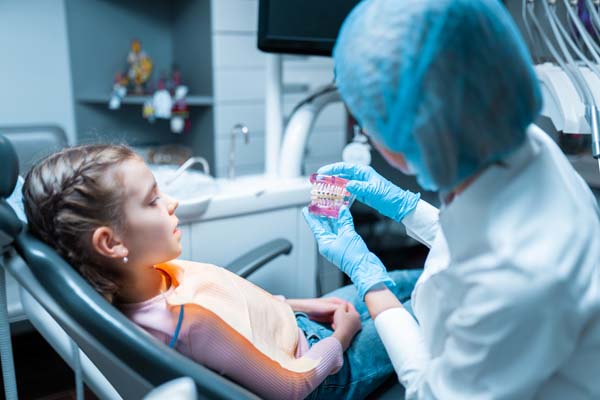The Importance of Early Cavity Treatment for Kids

Many parents neglect early cavity treatment for kids, as they may feel that it is not essential because the child’s teeth will eventually fall out and be replaced by permanent teeth, anyway. However, diagnosing and treating cavities in kids as early as possible is incredibly important. In this review, we discuss the reasons that early cavity treatment for kids is vital and the various treatment options that are available.
What parents should know about early cavity treatment for kids
Parents have the responsibility of helping their children protect their oral health. Although the focus is on the prevention of cavities, the fact remains that cavities can still form (and children are at greater risk for them). When cavities develop, it is crucial to promptly identify the signs and seek treatment from a licensed pediatric dentist.
What are the signs of childhood cavities?
The signs of a childhood cavity depend on the severity. In the early stages, the signs are less noticeable. For this reason, parents must check the health of their child’s teeth often. Children may not know the best way to communicate symptoms like tooth sensitivity. The signs parents should keep a close eye out for are:
- Enamel discoloration
- Holes in the teeth
- Teeth sensitivity
- Toothache/pain
- Dark spots
- Swollen gums
If a tooth has a severe cavity that extends toward the root of the tooth, the signs and symptoms may quickly become more severe. Severe pain, a tooth infection, and swollen gums may occur.
What are the different early cavity treatment options?
The recommended pediatric treatment option depends on the severity of the cavity. The earlier that a pediatric dentist can diagnose a cavity, the less invasive (and less costly) the treatment usually is. Notably, the different types of cavity treatments for kids include:
- Fluoride treatment
- Dental fillings
- Dental crowns
- Onlays and inlays
- Baby root canal
- Tooth extraction
If the child only has weakened enamel and has not yet developed sizable cavities, fluoride treatment may be all that is necessary. If there is a small to moderate cavity, a dental filling is typically recommended. For more severe cavities, such as those that extend toward the root of the tooth, a baby root canal procedure followed by the placement of a dental crown may be in order. In rare cases where the tooth cannot be saved, a tooth extraction may be the only viable solution.
What are the risks of not treating early childhood cavities?
Childhood cavities are likely to worsen without treatment, leading to unnecessary pain and sensitivity that can easily be prevented through early cavity treatment. Additionally, children with childhood cavities are more prone to alignment concerns once their permanent teeth start to replace their primary teeth. This can lead to an increased need for orthodontic services.
Contact our dental practice today for early cavity treatment for kids
Are you searching for a pediatric dentist for your child? Whether your child has a cavity that needs treatment or is simply due for their next check-up and cleaning visit, we are here to help. Contact us today to receive answers to your questions and schedule a consultation visit with our pediatric dental team.
Request an appointment here: https://bergencountypediatricdentistry.com or call Bergen County Pediatric Dentistry at (201) 312-6937 for an appointment in our Allendale office.
Check out what others are saying about our dental services on Yelp: Pediatric Dentist in Allendale, NJ.
Related Posts
Though rewarding, parenting is often difficult. One of the most difficult aspects of parenting that you will encounter early in your child’s life is teething. Fortunately, a pediatric dentistry professional can help you understand what to expect and, more importantly, give you advice on how to ease your child’s pain during this challenging time in…
Pediatric dentistry focuses on diagnosing, preventing, and treating oral health concerns in children who still have their baby teeth. This review closely examines what parents and the pediatric dentistry team can do to protect baby teeth from cavities, dental trauma, and other forms of damage.Caring for baby teeth should involve brushing and flossing regularly, limiting…
Cavities are a fact of life for people of all ages. Even with routine pediatric-dentistry care, most people will develop at least one cavity by the age of 20, according to the Centers for Disease Control and Prevention. Children can be especially prone to cavities for reasons including:Diets high in sugarInability to independently clean teeth…
One of the primary goals of pediatric dentistry is to prevent oral health concerns rather than only dealing with them if they develop. In addition to educational services to help parents care for their child's teeth between visits, pediatric dentists offer preventive dental treatments that help reduce the risk of cavities, gum disease, and other…
